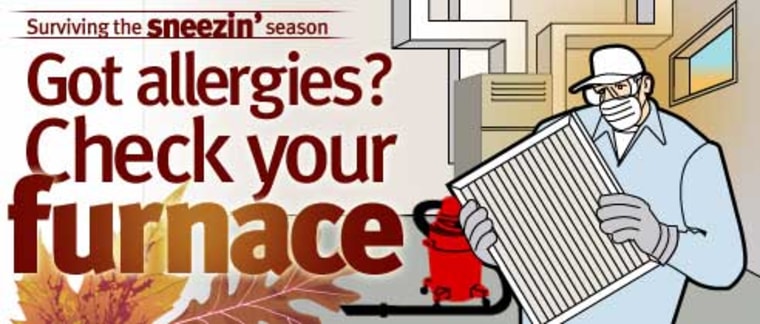The autumn leaves are falling and there’s scarcely a plant in your area to be found poofing pollen particles into the air. So why are you still sniffling, sneezing and wheezing? It could simply be your heater, experts say.
Each fall, when people crank up their forced air heating systems for the first time of the season, houses can be flooded with dust and other throat-clogging gunk, experts say.
Heating ducts have the whole summer to accumulate dust and other allergens. And, “sometimes when people turn their heat on in mid- to late October, for the first week they find themselves coughing and sneezing,” says Dr. Marjorie Slankard, an associate clinical professor of medicine at Columbia Presbyterian Medical Center in New York City. “That’s especially true if the heating ducts have not been cleaned for a while.”
One way to cure this problem is to have the heating ducts cleaned prior to firing up the system for the first time, says Dr. Adrian Casillas, an assistant professor of medicine in the division of clinical immunology and allergy at the University of California, at Los Angeles, School of Medicine.
Casillas suggests leaving the house while the ducts are being cleaned.
“When they’re being cleaned, a lot of dust and mold particles will be released,” Slankard agrees. “So it’s better to be out of the home for several hours during and after the cleaning.”
Once the ducts are cleaned, it’s important to make sure your heating filtration system is up to snuff, experts say.
Try using HEPA filters
Slankard suggests using permanent HEPA type filters in your heating system.
“These filters remove over 90 percent of particulate matter,” she says. “They’re much better than disposable filters.”
It’s important to remember to clean the permanent filters, though.
“Once the filter gets saturated, it impedes the flow of air,” Casillas says. “Then the heating system is less efficient and the filter won’t work.”
Another strategy is to block dust and other allergens at the outlets of the heating vents, experts say. If you live in an apartment and have no control over the filtration at the furnace end of things, this may be the only way to clean up the air coming into your home.
“We used to recommend that people fasten a piece of cheesecloth over the ducts’ outlets,” Slankard says. “But there now there are companies that make devices that have a filter you can Velcro over the duct cover.”
Is your air too dry?
Allergens aren’t the only problem for irritated throats and sinuses during the fall and winter. Forced air systems can also overly dry the air, which leads to parched and irritated mucous membranes, Casillas says.
In some people, mucous membranes become so irritated that people end up with frequent nose bleeds, Slankard says.
To avoid this, humidity should be kept moderate — between 35 percent and 50 percent, Slankard says.
In most cases, a humidifier will solve the problem, experts say.
But some people will end up with nose bleeds even with a humidifier. For them, Slankard recommends a few squirts a day with a saline solution nasal spray.
The New York physician also recommends that people make sure they’re consuming enough water to counter the dry air.
Another problem with forced air heating systems is that they stir up any allergens already hanging around your home.
If you’ve got mold, or spores or pet dander lying around, the blast of air from the heating system will set it in motion, Casillas says. “So then these allergens will be available to humans for a bit longer,” he adds. “That’s just one of the consequences of a system that blows things around.”
Ultimately, Casillas says, if you have a choice in heating systems, eschew forced air.
“In the long run, a radiant heat system is probably better,” he says.
Linda Carroll is a free-lance reporter based in New Jersey. Her work has appeared in The New York Times, Health and Smart Money.
